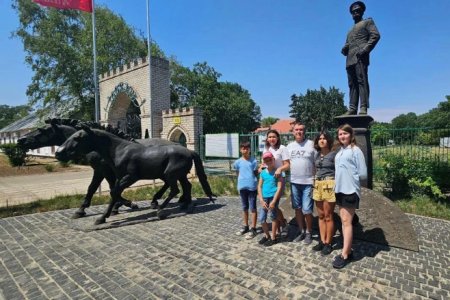
Russia has formally stripped Vladyslav Afanasiev, a political prisoner from Feodosia in occupied Crimea, of his Russian citizenship. This will almost certainly result in his being prevented from returning home, to Crimea, while it remains under Russian occupation. The aggressor state claimed that Afanasiev’s donation to rescue Ukrainian children constituted ‘treason’ with respect to Russia and is now using this allegedly serious charge as excuse for stripping him of the Russian citizenship which it foists on all Ukrainians living on occupied territory. Vladyslav is the fifth Crimean, after Crimean Tatar political prisoners: Ekrem Mamedov; Nasrulla Seidaliev; Lenur Seidametov and Marlen Mustafayev to be stripped of their citizenship. Since Russia is using the same ‘treason’ or ‘terrorism’ articles of its criminal code against a huge number of Crimean Tatar and other Ukrainian political prisoners, the number is likely to increase.
The Soviet regime used similar methods to get rid of ‘dissidents’ like Alexander Solzhenitsyn; Mstislav Rostropovich and Petro Grigorenko, in cases where the person’s prominence made banishment less of a ‘hindrance’ to the regime than direct imprisonment. Russia has applied the same methods since 2014 in order to banish Crimean Tatar leaders Mustafa Dzhemilev and Refat Chubarov from their homeland. Whether or not publicly stated, the same is clearly the case with those relatively few Crimean Tatar or other Ukrainian political prisoners released in prisoner exchanges since 2014.
The Russian regime dropped all pretence in 2022, and its methods now are increasingly brazen. On 20 March 2025, Russian leader Vladimir Putin issued a particularly cynical decree, according to which Ukrainians in occupied Ukraine without Russian citizenship can, from 10 September 2025 be labelled ‘foreigners’ and deported.
In occupied Crimea, Russia now seems intent on using fabricated criminal charges as a weapon for removing civic journalists and activists, as well as others who have refused to conceal their pro-Ukrainian position. The moves are also a threat to others, that they will face, not only imprisonment, but deportation for their refusal to remain silent. Russia has used most fake ‘terrorism’ changes against Crimean Tatars, in particular activists and journalists of the crucial Crimean Solidarity human rights movement. Many had earlier faced pressure on them to leave Crimea and had refused. Now, after foisting its citizenship, Russia is using deprivation of such citizenship as a method of new deportation – a particular tragedy for Crimean Tatars, who were prevented from returning to their homeland for close on half a century after Stalin’s Deportation of the entire Crimean Tatar people in 1944.
Vladyslav Afanasiev (b. 17 December 1990) is a history graduate who has been imprisoned since the summer of 2024. He is now imprisoned in the Russian Federation (Tatarstan), thousands of kilometres from his family and home in Feodosia. The conditions are appalling, with the dirty water and poor nutrition causing serious teeth problems and constant leg pain from not being allowed to sit down at all during the day. Despite this, Afanasiev has told his parents that at least he can be pleased to no longer be held in SIZO No. 2 in Simferopol. This is one of two SIZO, or remand prisons, opened by the Russian occupiers after the full-scale invasion of Ukraine. It is run by Russia’s FSB and is believed to hold only political prisoners, including many abducted from other occupied territory.
Eskender Bariev, Director of the Crimean Tatar Resource Centre, reports that Afanasiev was seized in the summer of 2024, seemingly, because he had photographed Russian military boats and posted the photos on social media.
On 6 December 2024, the occupation ‘prosecutor’ reported that the so-called ‘Crimean high court’ had sentenced Afanasiev to 15 years in a maximum-security prison colony. This was on supposed ‘treason’ charges under Article 275 of Russia’s criminal code. It was claimed that, in March 2023, he had gathered, and passed on, via chat-bots controlled by Ukraine’s Defence Ministry, photographs and the geolocation of places where paratrooper and military boats are deployed in Feodosia.
The other alleged justification for ‘state treason’ charges was that Afanasiev had, in August 2022, transferred money to a fund in support of Ukraine’s Armed Forces.
The claims were rejected by Afanasiev’s cousin, Ihor Kryvonos. It was not a military vessel that Afanasiev photographed, but a ship that had been taken out of service and was moored in a civic port. There was nothing at all secretive about this, with Afanasiev having posted the photo on social media.
Kryvonos also dismisses the assertion that his cousin transferred money to Ukraine’s Armed Forces. The prosecution claimed that Afanasiev had done this via a person called Ilya. The latter, however, was no SBU [Ukrainian Security Service] officer, but a childhood friend of Afanasiev’s, who works as an electrician. According to Kryvonos, his cousin made only one bank transfer of around 10 dollars, at the beginning of the full-scale invasion, to help rescue children from occupied territory.
These are judicial farces, not trials, with essentially nothing, no degree of proof, likely to change the predetermined convictions and long sentences. The Crimean Tatar Resource Centre learned on 13 March 2025 that the sentence had been upheld by an occupation ‘Crimean court’. Vladyslav’s family, who had been denied any contact with him, were to be allowed one short visit before he was illegally sent from Crimea to a prison colony in Russia.



